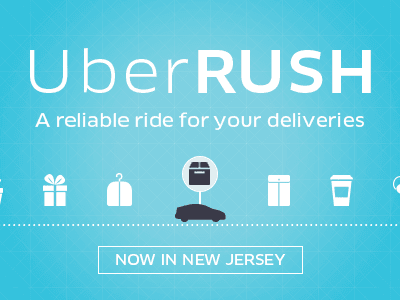Uber has recently been valued at $17 billion. Not bad for an app that basically does nothing more than being a marketplace for taxi rides. Here in Europe, Uber has been all over the news as cities like Brussels and Berlin have blocked access to their taxi marketplaces. In some cities, there was talk of a taxi war. I have not yet tried booking a ride through Uber, have you?
Call an Uber for your Package?
Uber has recently decided to move into Logistics by starting up a new service called UberRUSH in Manhattan. As you can read in this article on the Washington Post website:
“The new service signals the company’s expansion beyond local transportation and into the much larger world of urban logistics. And it’s a savvy play for several reasons: The same back-end technology that Uber has built to track drivers and connect them to riders can easily be used to order and follow deliveries.”
The question is: are they in time, and have they chosen the right model to take on the urban logistics challenge of near-instant delivery? It seems that, at least when it comes to Asia, they have missed out. Two start-ups have launched services very similar to Uber’s transportation service but focused on cargo. Meet Hong Kong companies EasyVan and GoGoVan. Both have a very similar and straightforward way of working:
- Download the App
- Put in your order information, like route, date and time and book a van in 30 seconds.
- Follow your driver with real-time GPS tracking.
- Rate the driver. The best drivers will get priority.
The Difference Between Asia and Europe
When you look at the logistics industry’s state in Asia, it is not as structured as Europe or the US, which may explain why these startups are so successful. If you look at the market for delivery vans in Hong Kong, there are over 100,000 delivery vans, of which companies own at least 70,000, and over 30,000 are owner-operators/freelancers. It is this last group that EasyVan and GoGoVan are aiming at. The freelancers often pay call centres to get orders, but many call centres are not very effective. By pooling these drivers through their apps, the start-ups are a blessing to both the freelancers and those looking for a van to deliver their goods.
Looking at Europe, the number of unorganized owner-operators, even in the largest city, is much smaller than the huge numbers in Hong Kong. Still, Uber-like Logistics could be a great solution here, as well. Like Hong Kong, it could bring more business to small-sized and medium-sized courier companies, and Uber-like logistics could even use it to optimize the transportation market. In Europe, couriers are driving millions and millions of empty miles. Even using an app like EasyVan or GoGoVan to fill the empty miles for larger courier companies would mean a huge optimization. Also, improving the load factor for couriers would be great for the environment, and let’s not forget the drop in the price for deliveries.
Would you use Uber-like Logistics to get your goods delivered? Would you use a crowdsourced logistics concept? Or an old school courier or parcel service?




